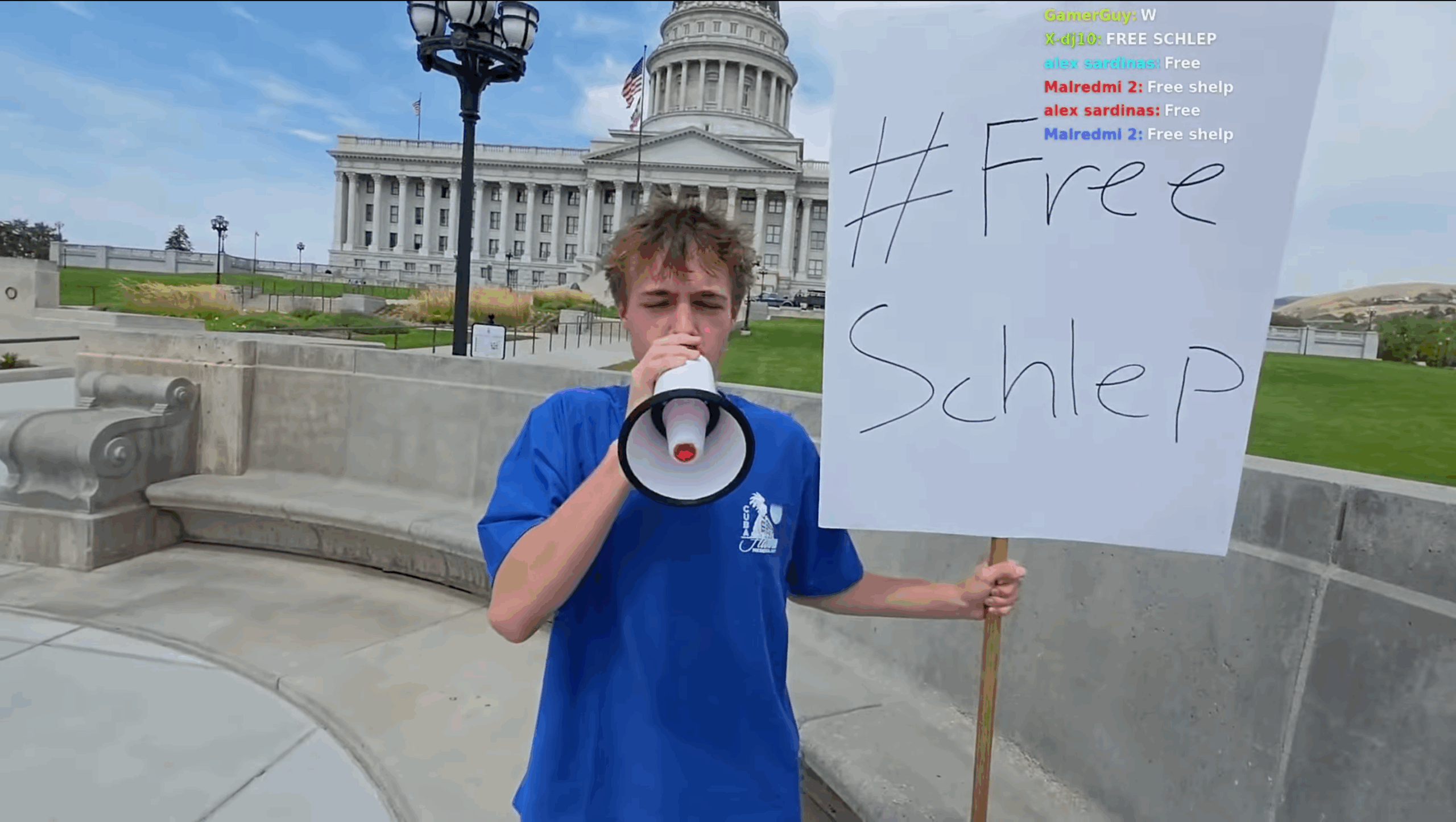A gaming platform used by nearly 400 million people a month is in turmoil after the company that owns it banned a user who goes by the name Schlep.
It’s unclear why the user, a 22-year-old Texan, adopted a moniker drawn from Yiddish. But his showdown with Roblox over his efforts to rid the platform of child predators has propelled the word meaning “a long, laborious, tedious journey” into public view.
Now, YouTubers are tracking the developments in the conflict with a #Schlep hashtag. Streamers with 3 million followers staged a live protest at the Utah State Capitol, holding signs that said “Free Schlep,” for tens of thousands of online viewers. And one of the most popular Roblox creators is selling a shirt with Schlep on it.
Schlep was well known to diehard Robloxers before this week because of his practice of identifying suspected child predators on the platform and luring them to private chats and, at times, offline meetups where some have been arrested. Schlep and his supporters say he is taking action to keep its child user safe where the company does not.
But his popularity exploded over the weekend when he told his followers that Roblox had ordered him to cease his activities and banned him permanently from the platform, saying that he was violating the company’s rules.
Facing a growing backlash, the company doubled down on Thursday, releasing a statement that, to some, seemed to equate Schlep and his collaborators with the child predators he reviles — and says victimized him when he was a young Robloxer himself.
“Similar to actual predators, they often impersonated minors, actively approached other users, then tried to lead them to other platforms to have sexually explicit conversations (which is against our Terms of Use),” the company said in a statement.
Schlep decried the comparison in a post on X, writing that he and his fellow vigilantes use “the same tactics that the FBI, ICAC, and local police departments use in their own operations to catch predators.”
(Thiago Prudêncio/SOPA Images/LightRocket via Getty Images)
The Schlep crisis has added to longstanding pressure on the company over abuse issues. Just this week, Louisiana sued Roblox for creating an environment within the game where child sexual predators “thrive, unite, hunt and victimize kids,” while Rep. Ro Khanna, a California Democrat, launched a petition this week urging Roblox to “do more to protect children.” Indonesia said it was considering a ban on the platform, and Qatar went further, blocking Roblox entirely in the country.
Roblox has also long faced concerns about its content moderation, including from Jewish watchdogs who note that its structure of decentralized games and its child-dominated user base make it vulnerable to problematic behavior. The Anti-Defamation League, in contrast to Schlep and his supporters, has said the company has relatively robust content standards.
In 2022, the platform removed a user-created Nazi gas chamber simulation. And in 2023, after Hamas’ Oct. 7, 2023, attack, the Israeli government urged users to report pro-Palestinian activity in the game that it said included antisemitic content. Reporting the offensive behavior to Robox directly, it said, was key to getting the company to act.
Schlep’s critique of Roblox’s moderation has extended beyond grooming to the prevalence of Nazis on the platform. In June, after the FBI arrested a man it said was using Roblox to plan a real-life terrorist attack, videos of Nazi simulations on the platform circulated on social media. “Just so you guys know the game those screenshots were taken in is a known extremist/nazi hub. Roblox has allowed it for years,” Schlep tweeted.
Earlier this month, after Roblox rolled out a new animation option allowing users to customize their movements, Schlep noted what he said was immediate abuse.
“Elons nazi salute is now on roblox 4 hours into the new animation launch,” he tweeted, referring to the gesture made by Elon Musk at a Trump inauguration event in January that many interpreted as a Heil Hitler.
Little is known about Schlep’s real life identity, except that his first name is Michael and that he lives in Texas. He has also operated a YouTube channel with Roblox simulations of theme parks, which he shut down following his ban. He has posted repeatedly on X about losing his appreciation for Ye, the rapper formerly known as Kanye West, over his antisemitism. And he appears to be a fan of the show “Better Call Saul,” the “Breaking Bad” spinoff about a complicated and violent Jewish character named Saul Goodman. In his latest videos, he wears a shirt from the show, and his X bio says “Better Call Schlep.”
On Friday, Schlep announced that he was going to sue Roblox, and the company’s stock prices appeared to be fluctuating because of the controversy. Whatever happens, the buzz has created a breakout moment for a venerable Yiddish word.
According to Moment Magazine, “schlep” is thought to be one of the first Yiddishisms to enter the American lexicon in the early 20th century, as Jewish immigrants from Eastern Europe flooded onto American shores. It filled a gap in the English language, which lacked a word with a similar meaning that carried the connotation of struggle.
In some ways, it’s an apt moniker for the Roblox activist who adopted it. Schlep appears to have accepted that he is traversing extensive digital territory at great expense and with uncertain results.
“No matter how it gets painted, me and my team got six predators arrested within the Roblox community in under a year,” Schlep wrote in a post on X Sunday. “I sleep well at night knowing these people will not be able to abuse anymore children on Roblox. My work will always have amounted to something.”
Keep Jewish Stories in Focus.
(JR) has documented Jewish history in real-time for over a century. Keep our journalism strong by joining us in supporting independent, award-winning reporting.




